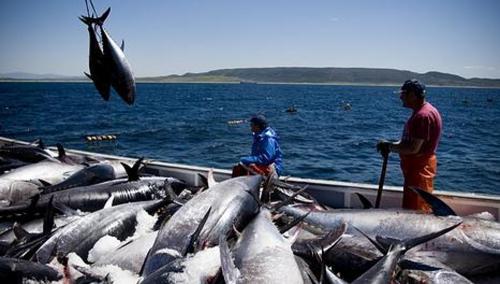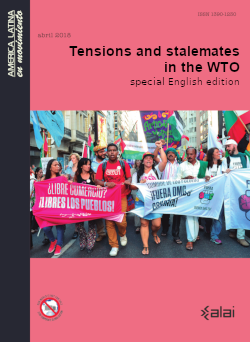Market Access the True Aim of WTO Fisheries Subsidies Negotiations
We must learn the lessons from the history of the WTO that negotiations are always about market access... Civil society needs to recapture the language on these negotiations and put development at their heart.
- Opinión

| Article published in ALAI’s magazine No. 532: Tensions and stalemates in the WTO 24/06/2019 |
For most of the year leading into the Buenos Aires Ministerial of the World Trade Organization (WTO) the negotiations on fisheries subsidies were seen as the most likely deliverable for Trade Ministers. The aim of negotiations, simply put, is to address subsidies that contribute to overfishing and illegal fishing, two activities that undermine the sustainability of stocks; but like all trade deals, this however isn't about sustainability at all instead it’s about securing market access for dominant fishing nations.
The origins of the fisheries subsidies negotiations come from the Doha Development Agenda and the 2005 Hong Kong Ministerial declaration. Sixteen years on from their launch, the push for an outcome has strengthened as Sustainable Development Goal 14.6 spurred on the WTO negotiations as it included a mandate to, among other things, “by 2020, prohibit certain forms of fisheries subsidies which contribute to overcapacity and overfishing, and eliminate subsidies that contribute to illegal, unreported and unregulated [IUU] fishing...”.
All of this matters because fish and fisheries are a big deal.
As stated in the South Centre's Analytical Note “as a source of employment more than 3.2 billion people live close to coastlines and rely on oceans and seas for their livelihoods. 97 percent of the world’s fishermen and women live in developing countries. More than 90 percent are employed in small-scale activities. About 60 million people are in artisanal and subsistence fishing activities worldwide, 15 percent are women.” For Pacific Island Countries, fish provides 50–90 per cent of animal protein intake in rural areas, and 40–80 per cent in many urban centres with most of the fish eaten by rural people coming from subsistence fishing. As reported by IUU Watch, in the Western and Central Pacific Ocean, Illegal Unregulated and Unreported fishing “claims at least €470 million annually, with actual lost revenue to Pacific Island Countries around €140 million.”
Leading into the Buenos Aires Ministerial, known as MC11, the negotiators had significant ground to cover. The previous year had not seen the gaps in negotiations close substantially at all and it's easy to see why.
Firstly, these negotiations deal directly with the issues of sovereignty. Under the UN Convention of the Law of the Sea (UNCLOS), nation states have sovereign control over their Exclusive Economic Zones (EEZs), these can extend up to 200 nautical miles from shore. Any outcome on the fisheries subsidies negotiations that restricted what governments could do within their EEZs – either to small-scale fishers or domestic fleets – was a direct undermining of their sovereign right. As such, the proposals from the African, Caribbean and Pacific group, Argentina, Costa Rica, Uruguay, Colombia, Panama and Peru, Least Developed Countries, and later India had language that included a carve-out for WTO Members’ EEZs and would have the prohibitions apply only in the high seas and in the EEZs of other members. The push by New Zealand, the EU, US and others to have it apply to domestic fishing was about those countries wanting less competition.
Secondly, it is about the right of developing nations to develop. The EU is a classic example of a Member’s using government support to develop an industrial fishing industry only to now turn around and tell other Members they cannot do the same. Now that the EU has transitioned away from providing subsidies to the building of fishing fleets, they are now proposing that those same subsidies be prohibited under these negotiations. Developing countries in the Pacific, Americas and anywhere else should not have their right to develop and utilise their own natural resources taken away from them, something that some proponents like the EU and New Zealand want to do in these negotiations.
Thirdly, the devil is always in the detail. With IUU, the question of who determines if someone is fishing illegally is central to making any prohibitions work, but is also hotly contested. Likewise who determines what stocks are over-fished and whether or not the WTO can override the management institutions who have the expertise in these areas.
Finally, some Members are pushing to have management measures included in any final outcome. This may not be a clear demand but the language of the proposals from the EU, NZ, Iceland and others is attempting by stealth to incorporate voluntary language from other fora into the legally binding frameworks of the WTO. This would undermine the ability of developing countries to determine how they manage their fish stocks.
So what happened at MC11? Thankfully not much. Ministers agreed to continue to negotiate, which doesn't sound like much but was a significant victory for developing countries. There were a number of prominent Members (NZ, EU, etc.) that were pushing hard to have an ambitiously worded ministerial statement agreed to, a statement that would be used as a precursor to achieve a final outcome that did not support the interests of the developing country members. Such was the campaign to pressure countries that one CSO group, who appeared on multiple platforms with New Zealand, singled out India in the media, accusing them of having “sabotaged” 20 years of fisheries subsidies negotiations by merely maintaining the developing country position. Members now have until the next Ministerial in 2019 to try to work it out.
Negotiations are always about market access
Looking ahead, there are a lot of challenges between now and any final outcome.
There is a strong need to show just what these negotiations are truly about. We must learn the lessons from the history of the WTO that – regardless of the language about development or in this case sustainability – negotiations are always about market access. Fisheries subsidies may be linked to the SDGs and some may be creating an environmental crisis in the oceans, but the text proposals by the rich nations show that their intent isn't sustainability but is about ensuring that developing countries, and those countries that own the resources, can't develop competing fishing fleets.
As negotiations continue towards a conclusion, it will be more important than ever to intervene. The texts will become increasingly important and the details more devilish, but it is the role of civil society to watch and act on this. As we saw in MC11, the prominent voice given to conservation groups who wanted an ambitious outcome of prohibitions regardless of the anti-development contents will only intensify as the crisis of dwindling maritime resources will be used to restrict, not the rich nations, but the ability of those countries whose resources have been exploited from maximising the benefits for themselves and their communities.
Civil society needs to recapture the language on these negotiations and put development at their heart. This is crucial not only for the small-scale and artisanal fishers whose livelihoods depend on some government support, but also for the ability of developing countries to maintain control of their resources and have the ability to determine their own development path.
Adam Wolfenden is the Trade Justice Campaigner for the Pacific Network on Globalisation (PANG). PANG is a regional network that promotes economic self-determination and justice in the Pacific Islands.
Del mismo autor
Clasificado en
Clasificado en:
Soberanía Alimentaria
- Gerson Castellano, Pedro Carrano 30/03/2022
- Silvia Ribeiro 29/03/2022
- Germán Gorraiz López 28/03/2022
- Silvia Ribeiro 16/02/2022
- Clara Sánchez Guevara 15/02/2022

